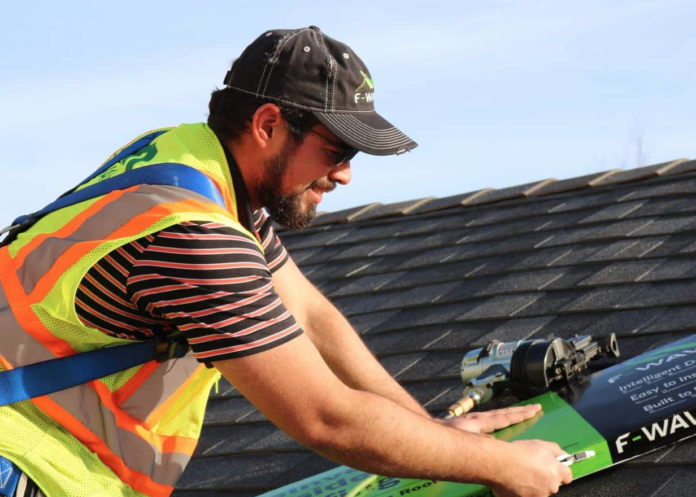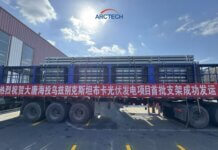F-Wave LLC has introduced its REVIA Hybrid solar roof tiles. F-Wave’s new tiles harvest both photovoltaic and thermal energy.
The company’s Hybrid tiles are up to 40% efficient, doubling the efficiency of traditional glass solar panels. The energy generated mirrors the energy demand of typical homes across the U.S., which require one-third electrical and two-thirds thermal energy – the majority of which is consumed for hot water and space heating.
The patented Hybrid thermal system supplies heated air from between the roof surface and the roofing underlayment into F-Wave’s proprietary heat exchanger. The system includes both an air-to-water passive heat exchanger and an air-to-water heat pump, providing the home with efficient hot water, space heating and cooling. It also significantly increases the homes total efficiency by reducing the thermal load from the sun. The thermal system achieves a coefficient of performance of up to 29 for space heating and 19 for passive water heating.
Summer and winter modes operate automatically or can be easily adjusted by the homeowner via a smart thermostat or its own iOS or Android app.
The Hybrid photovoltaic system utilizes F-Wave’s own lightweight, flexible, thin-film silicon solar cells, which are unique and produce more kilowatt-hours of energy per watt installed per year than traditional glass panels. F-Wave’s solar cells are suitable for south-, east- and west-facing roof surfaces, making them ideal for modern roof designs. Superior temperature tolerance enables the cells to maintain their efficiency during hot summer months, whereas traditional glass panels lose efficiency.
F-Wave solar cells have been tested for 20 years and have a long-term performance warranty equal to the best glass panels, the company says. The electrical wiring and connectors are pre-mounted, color-coded and polarity-exclusive, making connections simple and ensuring they are always installed correctly. This installer-friendly system enables the roofing contractor to complete the roof installation without the need for an electrical contractor on the roof. F-Wave’s electrical system optimizes power output from both large and small roof surfaces by using one microinverter to control up to 30 tiles at less than 60 V, which, in turn, makes the system intrinsically safe.
Complementary non-photovoltaic Hybrid tiles are also part of the system. These non-photovoltaic tiles can be easily cut to length or shape on-site using a standard craft knife. All tiles can be either screwed or nailed to the decking.
Photo: A contractor installing F-wave shingles




